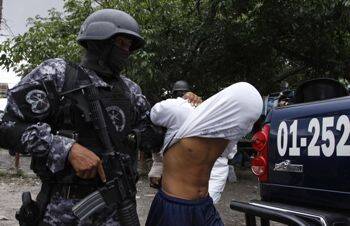The reality of life in postwar El Salvador is that nearly 20 years later violence continues to plague much of the country, Bishop Jose Elias Rauda Gutierrez of San Vicente acknowledged during an August visit to Washington. Bishop Rauda said that violence, poverty, unemployment, hunger and precarious living conditions continue to make life difficult for Salvadorans nearly 20 years after the 1992 end of the 12-year civil war. A Salvadoran government report released in early August tallied 91 murders in the previous five weeks in the Massachusetts-size country that has a population of 5.7 million, about the same as the state of Maryland. In just one department, Sonsonate, 32 murders occurred in the period covered by the report; a department is the political equivalent of a U.S. state. The daily problems of the Salvadoran people include dealing with poverty, unemployment and gang-related violence, ranging from extortion to murder, he said, noting that in some ways the violence is a vestige of the war, because so many weapons remained throughout the country. He said the country's fragile economy leaves plenty of room for drug gangs to recruit unemployed and undereducated youths. A statement of the Salvadoran bishops' conference released in early August gave the government credit for some efforts to "combat this scourge" of violence but said the crime crackdown "is not enough to give the people the social peace and security necessary."
Violence Plagues El Salvador
Show Comments (
)
Comments are automatically closed two weeks after an article's initial publication. See our comments policy for more.
The latest from america
"I again call for an immediate end to the barbarity of the war and for a peaceful resolution of the conflict," Pope Leo said.
Frank Turnbull, S.J., a longtime editor at 'America' who died earlier this week, is remembered as a humble, quiet and yet forceful presence to those who knew him during his 85 years of life.
A Reflection for Saturday of the Fifteenth Week in Ordinary Time, by Zac Davis
Trauma-informed spirituality knows better than to promise that prayer will take away all the pain. But it can offer the hope that, even in the midst of pain, there can be moments of feeling whole.








